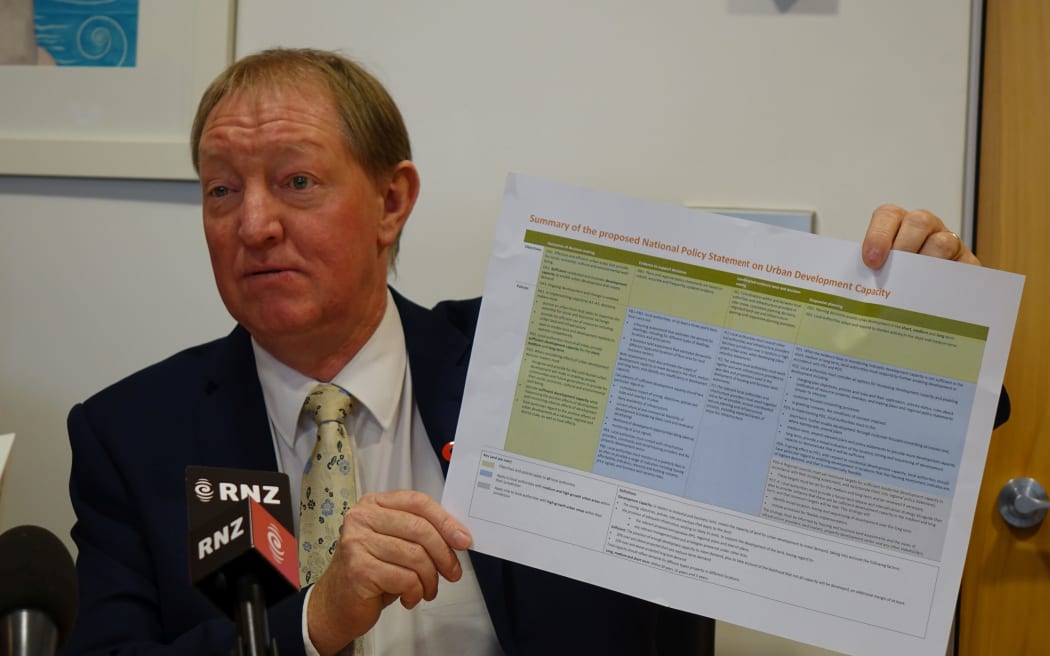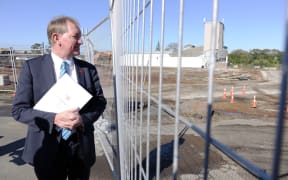Finance Minister Bill English has confirmed he's in talks with the Reserve Bank about debt-to-income ratios as a tool for influencing the housing market.

Bill English 24 May 2016 Photo: RNZ/Elliott Childs
Mr English says he is talking to the Reserve Bank governor about debt-to-income ratios, but won't prejudge the outcome.
"He's just come and said that it's a tool that they want to have a look at, they haven't asked for an inclusion yet."
Mr English said there was no single solution to the Auckland housing problem, but people needed to be careful about buying in an overheated market.
Councils will have to supply land for housing
Councils will have to ensure land supply for housing and business keeps pace with growth, under a new government policy.
The just-released National Policy Statement (NPS) for urban development covers all local councils, but targets Auckland Council as house prices in the city continue to skyrocket.
Building and Housing Minister Nick Smith said the government was not giving orders to councils, but it did expect them to comply.
Dr Smith said the cost of land was driving up prices and must be addressed by councils.
The statement requires councils to ensure land supply, and monitor and respond to housing affordability.

Building and Housing Minister Nick Smith at today's announcement. Photo: RNZ / Demelza Leslie
It also said councils should have an over-supply of "development capacity" of about 20 percent, to ensure competition.
Dr Smith said the NPS was not a short term fix.
"The problems of housing affordability - any politician that says that there's a single, magic bullet or sort of an instant answer is pulling the wool over their eyes.
"But these are the long-term, well-researched, well-considered responses."
Dr Smith said he would reserve judgement on whether or not Auckland Council planning was going to be sufficient, until it released its Unitary Plan.
But he said if councils did not meet the guidelines under the NPS, the government would use all of the legal and legislative powers available to it to make sure they did comply.
"But let me make no bones, through the National Policy Statement, the powers that that the government has under both the RMA and the Local Government Act, we are determined to see these issues of development capacity addressed.
"And if the Auckland Council proves unable to address them, we will use our legal powers to make sure they are addressed, because it is crucial to getting on top of these challenges around housing."

ACT leader David Seymour Photo: RNZ / Alexander Robertson
ACT leader David Seymour said the NPS implemented his party's long-held views on housing.
"While others have attacked foreigners and proposed new taxes and red tape, ACT has always said that housing affordability is fundamentally a land supply issue."
He said for now, the NPS was a step in the right direction.
"But going forward, National needs ACT to provide the support to pass more comprehensive RMA [Resource Management Act] reform preventing policies such as Auckland's failed metropolitan urban limit being introduced ever again."

QV figures show the average Auckland property price has increased 15.4 percent year on year. Photo: RNZ / Cole Eastham-Farrelly
Dr Smith has said the NPS is no "silver bullet" and had to be viewed within the government's broader suite of policies.
But Labour's housing spokesperson, Phil Twyford, said the minister was "firing blanks".
He said it was a "damp squib", unlikely to make any real difference.
"The land-bankers and speculators will read the NPS and rub their hands with glee."
Mr Twyford said the NPS failed two crucial tests.
"It has nothing to say about how infrastructure will be financed, leaving Auckland ratepayers to wonder whether they will be left to pay the $17 billion cost of new infrastructure needed to support Auckland's growth.
"And for all National's huffing and puffing about getting rid of the urban growth boundary, it says nothing about abolishing the boundary and replacing it with a smarter way of managing urban growth."
Plans 'align' with Auckland Council's
The new policy on land zoning aligns with what Auckland Council is already doing in the city, it says.
Deputy mayor Penny Hulse said the work the council had done on its incoming Unitary Plan addressed worries about future land supply.
The council already requires seven years of developable housing land to be available.





